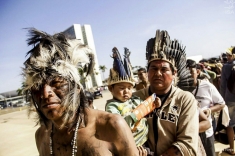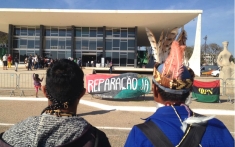Victory for Indigenous Peoples as Brazil’s Supreme Court Rejects Attempts to Limit Indigenous Land Rights
In a major victory for indigenous peoples, Brazil’s Supreme Court ruled unanimously this week in favor of indigenous land rights in two separate lawsuits, setting an important legal precedent.
“This is a very important victory for our people and our family...who are fighting for health and territory,” said Adilio Benites, a Guarani Kaiowá leader celebrating the decision in Brasilia, after holding an all-night vigil outside of the Supreme Court. Indigenous tribes and allies had protested around the country for several days before the Court’s decision, and international allies from around the world lent their voices to the call for land rights.
In reaching its decision, the Court rejected elements of a contentious legal argument known as ‘marco temporal’, used by the government of Michel Temer and conservative rural elites in attempts to blockade the titling of indigenous ancestral territories. The legal argument claims that indigenous lands should only be demarcated - titled to indigenous peoples - if clear proof exists that they were occupied by those communities in October 1988, the ratification date of the current Brazilian constitution.
As plaintiff in both cases, the government of Mato Grosso state claimed that portions of the Xingu Indigenous Park and territories occupied by the Nambiquara and Parecis people were initially ‘vacant lands’ belonging to the state government, and so their appropriation by the federal government in order to grant titles to indigenous tribes was illegal and deserving of financial indemnification. The Supreme Court ruled unanimously in both cases that overwhelming evidence exists to confirm the status of the disputed areas as traditional native territories, rendering subsequent land claims, and claims for indemnification, null and void.
The use of marco temporal arguments first emerged within the context of a 2009 Supreme Court ruling on the demarcation of the 1.7 million hectare (4.2 million acre) Raposa Serra do Sul indigenous territory in the state of Roraima, bordering Venezuela and Guiana. But just this month, the current Attorney General issued a legal opinion arguing for the widespread application of marco temporal, an opinion endorsed by President Temer.
The AG’s interpretation of marco temporal was widely criticized as unconstitutional, since it deliberately ignores the fact that numerous native communities were brutally driven off their ancestral lands, especially during the military dictatorship (1964-1985), and that returning to traditional territories is a process that often spans over years, especially in cases involving unresolved land conflicts.
In a key concurrence to this week’s ruling, Supreme Court Judge Luiz Roberto Barroso argued that the marco temporal argument does not apply generically to legal decisions concerning demarcation of indigenous territories beyond the specific case of Raposa Serra do Sol.
“The Supreme Court sent a very clear message that the rights of indigenous people are inalienable and must be respected,” said Luís Enrique Eloy, legal counsel to the Articulation of Brazil’s Indigenous Peoples (APIB). The Court “made it clear that marco temporal does not apply as a rule for formal recognition of other indigenous territories.” Mr. Eloy also emphasized that indigenous rights cannot be relaxed in the name of political and economic interests.
President Temer endorsed the marco temporal as part of negotiations for political support from a powerful congressional bloc, known as the ruralistas, representing large landholders and other corporate interests in the agribusiness and mining sectors. Last month Mr. Temer faced political uncertainty as the lower house of the Brazilian Congress considered whether to allow him to be investigated by the Supreme Court on charges of bribery and obstruction of justice. After making concessions to the ruralista lawmakers that included rollbacks on indigenous rights, reduction of environmental protected areas, legalization of land grabbing and support for gutting legislation on environmental licensing of development projects – not to mention billions in budget amendments earmarked to specific members of congress - Temer won a narrow victory in Congress and the corruption investigation was not allowed to proceed.
A Supreme Court endorsement of the marco temporal argument would have further jeopardized prospects for future demarcations of indigenous lands. This week’s rulings not only uphold Brazil’s constitutional recognition of indigenous land rights - a crucial victory for Brazil’s indigenous peoples - they also provide an important check on the Temer administration’s attempts to serve a retrograde and greedy agribusiness elite with proven disregard for human rights and environmental balance.
However, the rulings do not definitively end the menace posed by the use of the marco temporal argument to impede recognition of indigenous land rights. While concurring with the unanimous decisions on recognition of indigenous land rights in Mato Grosso, Attorney General Grace Mendonça made a pitch for its use in determining which indigenous territories should be apt for demarcation. A Supreme Court session to decide on the legality of the Attorney General’s position on the marco temporal, formally endorsed by President Temer, is expected to be held soon.





